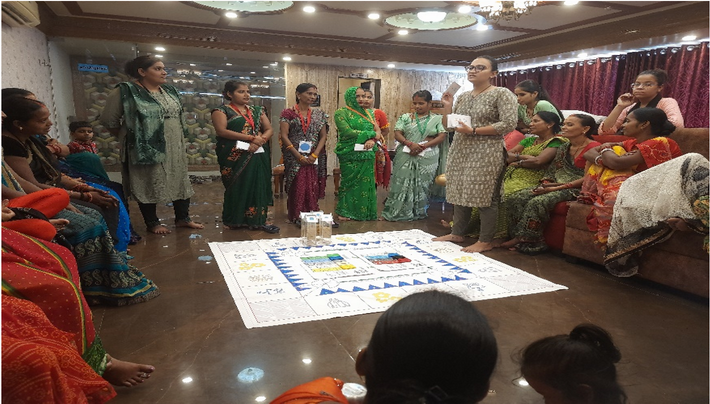
By Chirayu Brahmbhatt, Development Associate, Mahila Housing Trust, Gujarat, India
| “The 750 Rs I have received, have helped me to buy medicines for my husband. He suffered from dehydration while working on a construction site during the summer. I spent 200 Rs for buying medicines and the rest has served as an income for the 2 days of work, he lost due to bed rest.”
– Kanti Ben, a beneficiary of the Excess Heat risk Insurance |
Mahila Housing Trust is a grass roots socio-technical organisation that works with collectives of poor and low-income women on multiple issues such as access to basic services, climate change and its impact, participatory rights etc. In 2024, MHT embarked on a journey to roll out a Heat Insurance based on a parametric index. The idea of the product was simple: – MHT wanted to provide the women folk with an affordable and a convenient risk transfer mechanism that would particularly address the residual risks arising to due to excess heat.
The idea originated from a conversation between the Vikasinis, who are women leaders from the area, and the MHT staff during a training session. They discussed the impacts of climate change, focusing on how rising summer temperatures affected the Vikasinis, many of whom are home-based or non-home-based workers. They expressed concerns about how these high temperatures were influencing their occupations and income-earning potential. Though the women folk now have a plethora of options to deal with any exigencies with the help of credit/insurance facilities provided by financial institutions, one major risk remained. Credit/Insurance facilities don’t cover the residual risks i.e. the issue of loss in income/ increase in expenditure due to excess heat.
Since MHT has been working with these women folk on climate change from 2015, we have developed a good understanding of their core issues. They are,
MHT conducted a lot of trainings where women folk were educated about the impact of climate change and how an insurance could help them overcome it. We even developed a game called ‘Gud Luck’ to keep the sessions interactive for women. Some of the women folk were also helped with tech pilots such cool-roof paints so that the community at a large could understand the impacts of climate change via lived experiences. Lastly, the product was designed in a way that it didn’t result in a great financial burden for women in terms of the premium payment for the policy.
This strategy was vital for the product’s success during its pilot year. Nearly 2,000 female members received a payout of 750 INR due to the activation of the insurance policy. The comprehensive approach, combined with the early payout, has helped build trust among the female members, encouraging more women to embrace the product in the coming years.
Photo caption: Women Members playing Gud Luck Game to understand the need for parametric insurance.
Disclaimer: The views expressed in this piece are those of the author/s and do not necessarily reflect the views or policies of AIDMI.